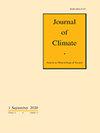The relative importance of Antarctic sea-ice loss within the response to greenhouse warming
IF 4
2区 地球科学
Q1 METEOROLOGY & ATMOSPHERIC SCIENCES
引用次数: 0
Abstract
Abstract The response to Antarctic sea-ice loss within a coupled modelling framework is examined in comparison to the response to Arctic sea-ice loss and within the context of general greenhouse warming. Sea-ice loss responses are found to be linear (particularly in response to Antarctic or global sea-ice loss) with respect to the degree of imposed perturbation and additive when perturbations are applied in hemispheres separately and concurrently. Globally, and in the tropical Pacific in particular, Antarctic sea-ice loss plays a relatively larger role than Arctic sea-ice loss in both the atmosphere and the ocean, within the parameters of our experiments. The pattern of response to Antarctic sea-ice loss is also found to more closely resemble that of greenhouse warming, again particularly in the tropics. An extension to multi-parameter pattern scaling is developed to include a scaling factor for Antarctic change in addition to those for tropical warming and Arctic sea-ice loss. The decomposition is applied to the modelled response to Antarctic sea-ice loss to break it down into component partial responses that scale with Antarctic, tropical, and Arctic changes. This reveals the aspects of the response that are directly related to Antarctic change, such as an equatorward intensification of tropical precipitation in the Northern Hemisphere, and those that are modified via the induced changes in the tropics and Arctic, such as Northern Hemisphere temperature change. With this, we hope to gain a deeper understanding of the role of each of these changes for the development of physical mechanisms of the response.南极海冰消失对温室效应变暖反应的相对重要性
摘要 在耦合建模框架内,对南极海冰损失的反应进行了研究,并将其与北极海冰损失的反应进行了比较,同时还结合了总体温室效应变暖的情况。研究发现,海冰损失的响应(特别是对南极或全球海冰损失的响应)与所施加的扰动程度呈线性关系,而当扰动分别或同时作用于两个半球时,则呈相加关系。在全球范围内,特别是在热带太平洋地区,在我们的实验参数范围内,南极海冰损失在大气和海洋中的作用相对大于北极海冰损失。我们还发现,南极海冰消失的反应模式与温室效应变暖的反应模式更为相似,尤其是在热带地区。对多参数模式缩放进行了扩展,除了热带变暖和北极海冰消失的缩放因子外,还包括南极变化的缩放因子。对南极海冰消失的模拟响应进行分解,将其分解为与南极、热带和北极变化成比例关系的部分响应。这揭示了响应中与南极变化直接相关的方面,如北半球热带降水的赤道方向增强,以及通过热带和北极的诱导变化而改变的方面,如北半球温度变化。因此,我们希望能更深入地了解这些变化中的每一种变化对制定响应的物理机制所起的作用。
本文章由计算机程序翻译,如有差异,请以英文原文为准。
求助全文
约1分钟内获得全文
求助全文
来源期刊

Journal of Climate
地学-气象与大气科学
CiteScore
9.30
自引率
14.30%
发文量
490
审稿时长
7.5 months
期刊介绍:
The Journal of Climate (JCLI) (ISSN: 0894-8755; eISSN: 1520-0442) publishes research that advances basic understanding of the dynamics and physics of the climate system on large spatial scales, including variability of the atmosphere, oceans, land surface, and cryosphere; past, present, and projected future changes in the climate system; and climate simulation and prediction.
 求助内容:
求助内容: 应助结果提醒方式:
应助结果提醒方式:


